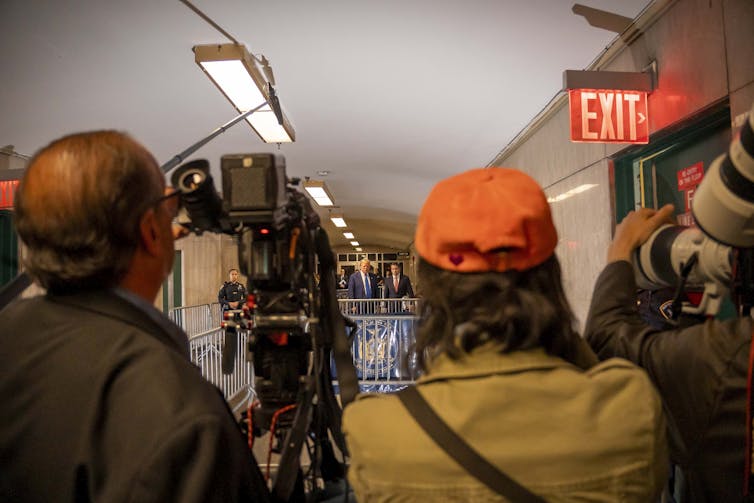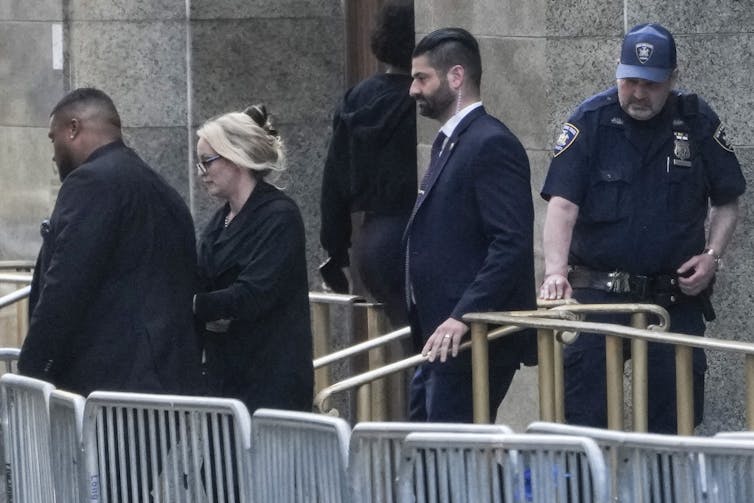
Mark Peterson – Pool/Getty Images
David E. Clementson, University of Georgia and John E. Jones III, Dickinson College
John E. Jones III is the president of Dickinson College and a retired federal judge appointed by President George W. Bush. David E. Clementson is a scholar of political communication at the University of Georgia and a specialist in political deception. Senior politics editor Naomi Schalit interviewed the two about the latest developments in the hush-money trial of former President Donald Trump, and the discussion ranged from the judge’s handling of the case (“Adroit,” says Jones) to the purportedly salacious testimony of Stormy Daniels (“No one really seems to care,” says Clementson).
What have you both seen from the trial in the past week that has stood out to you?
John E. Jones III: What impresses me is that, despite the circus that it could devolve into, I have to give Judge Juan Merchan credit for his adroit handling of the case. It’s clearly moving faster than many predicted. That’s the role of the trial judge, to keep the parties moving without rushing them. If you rush them, it cuts against justice, and I think he’s found the right balance in what he’s done.
David E. Clementson: I’ll also speak about the judge. From a political communication standpoint, I think the judge is making it easier for Trump to win the presidency. And Trump is responding by trying his best to get the judge to throw him in jail.
I say this for three reasons. First, the judge is keeping Trump in New York City, the media capital of the world. Most politicians would kill to get to have a press conference every day in New York City. If Trump were left to his own devices, he would be doing more rallies in places like Waukesha, Wisconsin, getting no attention and not moving the needle. Instead, he’s holding near daily press conferences outside the Manhattan courtroom.

AP Photo/Seth Wenig
Second, the trial keeps Trump seated all day at a table with paper and pen in front of him. He closes his eyes, he has time to think. Trump might be less prone to gaffes and could script statements that sound more presidential than if he were free to be running around, flying off the cuff and getting himself in even more trouble.
Third, the judge’s gag order is doing Trump a favor. The judge tells Trump what he can and cannot talk about, which happens to align with winning talking points. The judge forbids Trump from talking about witnesses in the trial or the jury, and the public happens to not care about them either.
Yet, Trump still insists on complaining about this stuff that voters don’t care about.
The judge said Trump can talk about his campaign. The judge is essentially ordering Trump to stay on a winning message.
And Trump effectively says, “No, I’d rather go to jail.”
Imagine if Trump did what the judge is telling him to do and used his daily press conference opportunity for a captive audience in the media capital of the world to give carefully scripted remarks about inflation, illegal immigration, crime – all winning campaign issues.
Does Judge Merchan, or any other judge in this kind of situation, think only about the narrow legal issues, or are these things that professor Clementson is mentioning going to keep him up at night?
Jones: I presided over some really high-profile cases that attracted a lot of attention. And I can tell you that once the trial starts, as the trial judge, your head’s in the trial, and you have to tune out the extraneous noise. A courtroom is a courtroom is a courtroom.
The noise outside the courtroom is interesting as well. I’m sure the judge notices that, but he’s managing the case inside the courtroom the way that he has to. I don’t think that Judge Merchan had any choice but to draft a gag order for Trump. In a criminal trial, you can’t have a defendant make the kinds of statements that Trump was making about witnesses and the jury. It is simply antithetical to our system of justice to have a defendant do that.
What’s interesting about the gag order is that last week the judge wrote something that I picked up as a former judge, and it wasn’t widely talked about. He said – vis-a-vis upcoming witness Michael Cohen, who was Trump’s former lawyer and fixer – that the gag order should “not be used as a sword instead of a shield by potential witnesses.” The judge has a real mess on his hands because Michael Cohen will not shut up; he’s baiting Donald Trump. In effect, Judge Merchan said in this part of the gag order that if Cohen keeps attacking Trump, the judge isn’t going to provide that shield.
And that’s exactly what Judge Merchan did this week. He did not find Trump in contempt on allegations that Trump directly impugned Michael Cohen’s credibility, even though the gag order says you can’t do that with a witness. So what he did functionally is he removed the shield as to Michael Cohen.
I’m wondering, from your discipline of political communication, do you see things that are happening in the courtroom – including the Stormy Daniels testimony – hurting Trump, not with a jury necessarily, but in public opinion?
Clementson: We have a sex scandal that’s actually boring to the public. That seems just remarkable because we’ve got a porn star testifying in court about having illicit sex with a former president of the United States – before he became president – and no one really seems to care all that much.
The details don’t seem all that lurid. One of the biggest details she confessed was that he wore boxers. She said that during the encounter he showed her a picture of his wife. And Trump denies having sex with her. The lack of tawdriness just seems remarkable to me.
Trump’s defense attorney just keeps hammering Stormy Daniels on things like, “You said you had dinner, but you didn’t eat any food. So was it really dinner?” And just going on and on like that – it’s like, are we trying to make her seem likable and sympathetic? None of it really makes sense.
We’re in the fourth week of the trial. When you look at it so far, what do you think?
Jones: I think that a lot of people want to leave the courtroom and take a shower based on a lot of the testimony that has been presented in the last couple days of trial in particular. I think it is absolutely remarkable in the annals of politics.
Clementson: The biggest thing to me isn’t the minutiae of what’s going on inside the courtroom. It’s Trump’s press conferences that he’s giving outside the courtroom to this audience of reporters in New York City. These remind me of the daily press conferences that Trump gave around this same time four years ago, during COVID in the White House.
He would address the world, and viewership was up there with the Super Bowl. Yet he used the opportunities largely to get combative with the press; he didn’t show a lot of composure and focused on minutiae that the public didn’t necessarily care about.
So there’s a real parallel, I think, with Trump having this opportunity before assembled media to speak to everyone amidst a scandal that has him cornered. COVID was a scandal that cornered him that he couldn’t get out of, as is this trial.
So he’s responding from a political communication strategy standpoint with his near daily press conferences. Instead of showing poise, foresight and composure and sticking to winning talking points, he’s frittering away the opportunity and going off message and getting combative in ways that even his base probably doesn’t really find all that sympathetic.![]()
David E. Clementson, Associate Professor, Grady College of Journalism and Mass Communication, University of Georgia and John E. Jones III, President, Dickinson College
This article is republished from The Conversation under a Creative Commons license. Read the original article.
















